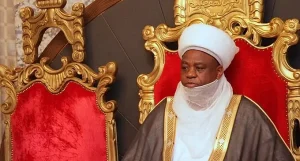Sokoto Islamic cleric defies Sultan, conducts Eid prayer on Tuesday

An Islamic scholar, Musa Lukwa, from Sokoto, has gone against the instructions of the Sultan of Sokoto, Sa’ad Abubakar, by conducting Eid prayers on Tuesday instead of Wednesday, as announced by the Sultanate Council.
Lukwa, who had previously disobeyed the Sultan’s directive on moon sighting, led prayers at his Juma’at mosque in the Mabera area of the Sokoto metropolis around 8:30 a.m.
The Islamic cleric reportedly claimed he chose to follow directives from the neighbouring Niger Republic where the Islamic authorities said they had sighted the moon and observed the Eid prayer on Tuesday, April 9.
Daily Trust reported that he said;
“There were reports of sightings on the new crescent in many places, including here in Nigeria, but the one that we were sure of is that of Niger Republic.
“We have a verified video clip of their (Niger Republic) council of Ulamah authenticating the report after which the country declared Tuesday as Sallah day. So it is now binding on us to observe Eid on Tuesday because this is what the teachings of the Holy Prophet say.
“If we can accept that of Saudi Arabia, why can’t we agree with that of Niger Republic which is nearer to us. I am not saying all Nigerian Muslims must observe their Eid prayer on Tuesday but we have no moral justification not to observe our prayer on Tuesday because the new moon was sighted by our neighbours. And remember there is no fasting on Sallah day, it is prohibited.”
Lukwa had divided opinions in the past after he and his followers slaughtered and ate a horse in Sokoto, arguing that it was halal. The position contradicts that held by the Malik Islamic School of thought being practised in Nigeria and the Sokoto caliphate. The cleric then challenged any scholar with a contrary view to a public debate.


